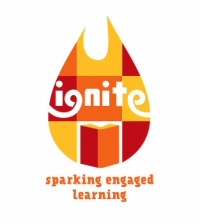By Erica Eding | gargoyle@flagler.edu
Christine Young is part of the biggest freshman class Flagler has ever seen, but she spends most of her time with the same group of people. She’s part of Ignite, Flagler College’s new learning community program.
Young and her 20-something classmates have three General Education courses together. After class they work on group projects which incorporate aspects of each class. The students are even together at night.
“You’re roomed with someone also in the program,” Young said.
Ignite is Flagler’s Quality Enhancement Plan, or QEP. A QEP is a necessary part of re-accreditation for the college. In spring of 2007, a committee of faculty, staff and students met to determine what could be done to improve the overall school environment.
Dean Alan Woolfolk, a member of the QEP Implementation Committee, said they decided to focus on student engagement. They discovered that students weren’t being challenged academically. Research showed that at least two-thirds of students who left Flagler were transferring to other schools rather than dropping out completely.
“We’ve found, I think, pretty clear evidence that students aren’t adequately engaged at Flagler,” Woolfolk said.
Ignite classes are taught differently than other General Education courses. This semester, they focus on the theme of “Understanding Power.” Students will study power through the lens of art, English and government.
“You’re basically bringing together several disciplines under one umbrella,” said Dr. Felix Livingston, the Chair of the QEP Committee.
“And you’re studying a topic from different perspectives.”
Instead of a typical course with papers and exams, Ignite students will take trips and work on projects. This semester, the freshmen will create political advertisements and showcase them at the Crisp-Ellert Museum.
Learning communities also allow professors to rethink their General Education courses.
“They also are a way of reinvigorating faculty and introducing them to fresh ideas,” said Woolfolk.
“It’s a way for them to recommit themselves to the vocation of teaching.”
Additionally, the Proctor Library has become a part of Ignite in order to better help the students. Library staff members are involved in the program. They sometimes even attend classes within the small learning communities.
Proctor’s Systems Librarian, Brian Nesselrode, has already been to two of the English classes and is familiar with the syllabi. He said that as a librarian, it’s much easier to help students find what they’re looking for when he’s familiar with the course.
“I’m looking forward to really targeting on the assignments that are given to the learning community students,” said Nesselrode.
Many Ignite students said they’ve already used Proctor Library as a resource.
“They [the librarians] are very helpful,” Young said. “They’ll put down what they’re doing to come and help you find what you need.”
Support from Flagler staff is also an important part of learning communities, according to art professor Patrick Moser. “The connections are there to make the learning more significant,” he said.
The five-year goal is for the program to include more than 400 freshmen. There will be 50 faculty members teaching in 30 different learning communities. Livingston said that the idea could spread to upper-level classes if faculty are interested.
The college is trying to spread the word about Ignite.
Elizabeth Daube, Public Information Media Specialist, said, “Because it is a requirement of reaccreditation, they want to definitely make sure that everybody is aware of it.”
Ignite has both a Web site and T-shirts, designed by Rosa Loves.
Faculty reports that the learning communities are going well.
“They seem to be enjoying it,” said Liberal Studies professor Rachael Cremona.
“I’ve had full attendance in my classes, which is pretty impressive.”



Be the first to comment on "‘Ignite’ classes encourage student interaction"